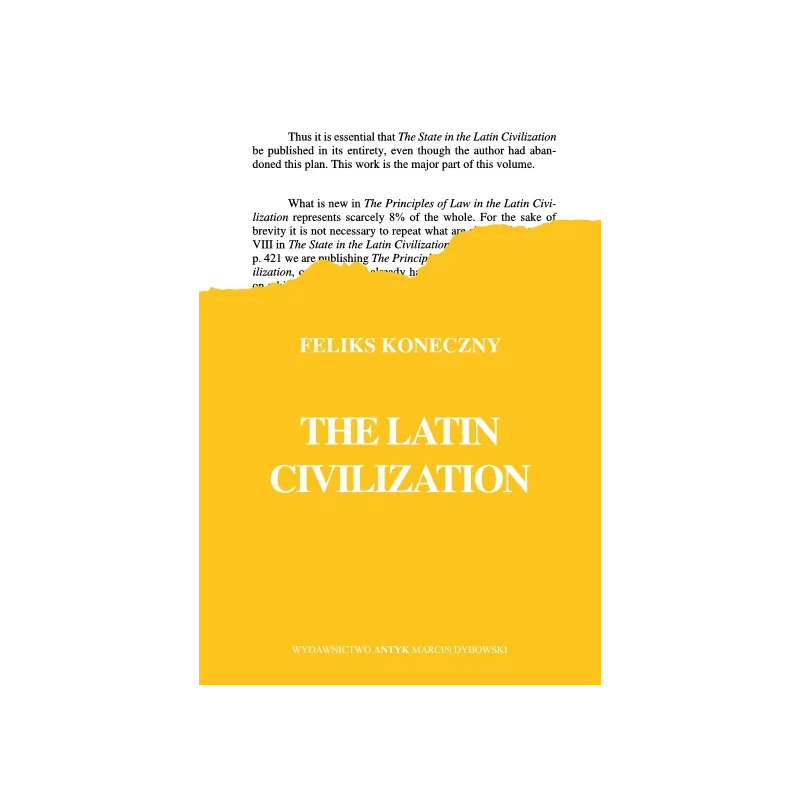

Feliks Koneczny never wrote a book enti-tled The Latin Civilization, but he did write about it in all of his works. The present volume contains a compilation of several texts that deal specifically with the Latin civilization. These are two books, The State in the Latin Civilization and The Princi-ples of Law in the Latin Civilization. The close relationship be-tween these two books is explained in the Publisher's Note of their London (1981) edition. Also some short fragments per-taining specifically to the Latin civilization taken from several of Koneczny's smaller papers are included. Finally this is fol-lowed with the booklet The Church as the Political Educator of Nations.
 Polityka prywatnośći - Dbamy o Twoją prywatność. Tutaj znajdziesz informacje dot. zasad przetwarzania danych osobowych.
Polityka prywatnośći - Dbamy o Twoją prywatność. Tutaj znajdziesz informacje dot. zasad przetwarzania danych osobowych. Zasady dostawy
Zasady dostawy Regulamin zwrotów - Kupuj i sprawdź spokojnie w domu. 14 DNI NA ODSTĄPIENIE OD UMOWY BEZ PODANIA PRZYCZYNY.
Regulamin zwrotów - Kupuj i sprawdź spokojnie w domu. 14 DNI NA ODSTĄPIENIE OD UMOWY BEZ PODANIA PRZYCZYNY.Table of Contents
Translator's Note
Publisher's note of the London (1981) Edition
THE STATE IN THE LATIN CIVILIZATION
I. Introductory Chapter
II. Confronting Civilizations
III. Ethics and Law
IV. Private and Public Law
V. States and Societies
VI. Administration
VII. Bureaucracy
VIII. The State and the Decalogue
IX. Errors in the Love of Neighbour
X. Self-governing entities
XI. Schools
XII. The Judiciary
XIII. Political Parties and Parliaments
XIV. Four Ministries
XV. Vis-?-vis Lithuania and Ruthenia
XVI. Vis-?-vis the Slav World
THE PRINCIPLES OF LAW IN THE LATIN CIVILIZATION
I. Definitions
II. In the Face of Civilizations
III. Ethics and Law
IV. Private and Public Law
V. States and Societies
The whole chapter is the same as on p. 101 in SLC.
VI. Administration
The whole chapter is the same as on p. 139 in SLC.
VII. Bureaucracy
VIII. The State and Decalogue
IX. The Nation
FRAGMENTS PERTAINING SPECIFICALLY TO THE LATIN CIVILIZATION FROM SUNDRY PAPERS WRITTEN BY FELIKS KONECZNY AT VARIOUS TIMES
THE CHURCH AS THE POLITICAL EDUCATOR OF NATIONS 1938
I. About the Methods
II. Four Postulates of Catholic Missions
III. The Principles of the Public Life of Nations
IV. Universalism and the Idea of a Nation
V. The Presence of the Church in History (expressed in two sentences)
VI. The Following of the Church's Principles in the History of Poland
Literature
Index of Personal and Place Names
Feliks Koneczny (1862-1949) never wrote a book enti-tled The Latin Civilization, but he did write about it in all of his works. The present volume contains a compilation of several texts that deal specifically with the Latin civilization. These are two books, The State in the Latin Civilization and The Princi-ples of Law in the Latin Civilization. The close relationship be-tween these two books is explained in the Publisher's Note of their London (1981) edition. Also some short fragments per-taining specifically to the Latin civilization taken from several of Koneczny's smaller papers are included. Finally this is fol-lowed with the booklet The Church as the Political Educator of Nations. There is much about the Latin civilization in other books of Koneczny that have already been translated into Eng-lish. These can be consulted directly by English readers .
As in the previous translations of Koneczny's books, all additions that come from the translator are given in square brackets [ ]. Koneczny wrote for the Polish intelligentsia of his generation assuming a certain level of general knowledge of languages, culture and history, both Polish and universal. Where the translator considered it necessary to add some ex-planation, either in the text or in the footnotes, this is in square brackets.
The compilation of texts was done by the translator.
Feliks Koneczny (1862-1949) studied civilizations analysing their underlying ethical and also religious, legal and sociological components. Arnold Toynbee characterised him as a scholar who "approached his generalisations from the four standpoints of a student of East European and Central Asian history, a Pole, a Roman Catholic Christian and a Westerner." Koneczny viewed the Jewish civilization from the outside, as a critic, but also admiring its versatility, durability and consistency.
Koneczny finished writing this book in 1943. At that time the largest portion of the world's Jewish population lived in Poland. Most of them followed a distinctive lifestyle setting them apart from the Polish population. They worshipped differently, dressed differently, spoke a different language, and lived in separate sectors of the towns. They appeared to be very different from the integrated Jews of the West. And yet Koneczny deciphered the nature of the bond tying them with the rest of the world's Jews. Koneczny knew nothing about the holocaust which was about to happen, and the state of Israel was something of the future. His conclusions however still remain pertinent in the present globalized world.
Maciej Giertych (2016)
Opis
Brak recenzji użytkowników.